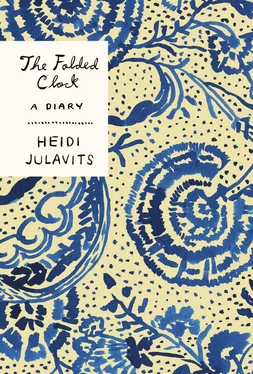The secretary requested I update my information when I settled my bill. Because of my dead doctor, I nearly didn’t. In Maine, computers function as keepers of nostalgically outmoded ideas and things, kind of like historical societies. But I needed to input my new insurance company information, so I updated everything, including the name of my old doctor. Next time I visited the ER, there would be no trace of him.
I kept the ER bracelet on my wrist. Partially I wore it to make myself feel less terrible about erasing him. But I also wore it because of my failure ever to properly thank him for his doctoring while he was alive. He bent over backward to help me, not that I needed his help very much, but when I did, he gave it. I’d repeatedly said to my husband, “I need to write him a note to tell him how wonderful he is.” I never wrote a note. After he was killed, my husband made me feel better about the note I never wrote by saying, “I bet he received so many notes like that.” But what if other people assumed as I did, that all of his patients sent him notes, and thus they did not need to send him one? Maybe he’d never received a single note from anyone.
So at the barbecue many people asked me about the hospital bracelet, including a woman who, after I told her the story of my dead doctor and my subsequent guilt and how I couldn’t, because it was the final connection I had to this man, cut the bracelet off yet, she said, “Wow, that was not what I was expecting to hear.” She declared that, due to this bracelet story, she would need to totally rethink who she’d thought I was. I didn’t ask how I’d formerly been categorized, or how I’d be re-categorized based on this updated information.
Recently I read a piece by Julian Barnes about the painter Lucian Freud. Barnes writes,
In one version of the philosophy of the self, we all operate at some point on a line between the twin poles of episodicism and narrativism. The distinction is existential not moral. Episodicists see and feel little connection between the different parts of their life, have a more fragmentary sense of life, and tend not to believe in the concept of free will. Narrativists feel and see constant connectivity, an enduring self, and acknowledge free will as the instrument which forges their self and their connectedness. Narrativists feel responsibility for their actions and guilt over their failures; episodicists think that one thing happens, and then another thing happens…. Narrativists tend to find episodicists selfish and irresponsible; while episodicists tend to find narrativists boring and bourgeois .
These two approaches might typify our differences as people, this woman and I. She’s episodic, I’m narrative. I see connections everywhere. She’s a woman who has lived many fantastic yet disparate and self-canceling lives. She’s a rebooter, a category shape-shifter. I entered a track in my twenties and stayed on it and on it. She’s my occasional fantasy; I don’t know if I’m hers. But I suspect this is why our relationship is strained occasionally. We remind each other of who we aren’t. I am herself betrayed. She is myself betrayed. I don’t know for a fact, but I can bet she’s told herself, or told her husband, that she’s relieved she’s not me. I have told my husband that I’m relieved I’m not her. I only sometimes mean it.
Today I met a reclusive writer/editor who lives in our town. I’ve been hoping to meet him for years. The closest I’ve come to meeting him is seeing his name written on the DRY CLEANING READY list they tape to the cash register of the general store when the shirts come in.
I finally met him not at the general store but at the boatyard. I was wearing a bathing suit and the writer/editor was fully clothed. It seemed inappropriate to be meeting this man in my bathing suit, primarily because this is not a dock where people are often seen wearing bathing suits, and secondarily because this man is ninety-seven years old. Plus my bathing suit is ridiculous on so many design levels; my left breast pops out when I shrug, or when I inhale, or when I put my hand on my hip. For swimming it is completely stupid, but it is a one-piece and thus more sensible than a bikini, and so it is the suit I wear when I swim to the Goodale buoy. Today this is what I intended.
I tried to cover myself with my arms as I shook this man’s hand; I told him how excited I was to finally meet him. I asked how much time he spent in Maine (as opposed to New York, where he also lived); he said he’d been here most of the summer. He made reference to the fact that, after the recent passing of his wife, Maine seemed the pleasanter place to be.
Coincidentally, three children and I had visited his wife’s grave earlier that day. We’d gone to the cemetery to bring flowers to a number of people: E. B. White and Katharine White; also the “youngest person in the cemetery” (given the youngest members tragically warranted little more than an INFANT tombstone, this superlative status proved impossible to determine); and the grave of the bootlegger whose name I stole to give to my daughter. I’d specifically shown the kids the writer/editor’s wife’s grave, because, since last summer, it was new. He had a matching grave beside hers. It was also new. I suggested his wife might qualify as the “youngest” in the cemetery (in that she was the newest member) and was probably deserving of flowers. She got some. Then the kids noticed that the writer/editor’s grave did not have a death date on it yet. I explained that this was because he was still alive. I explained that people sometimes buy and erect their tombstones before they die. This confused them. The existence of a tombstone for a not-yet-dead person wasn’t the source of their bewilderment. What bewildered them was the etiquette involved. They had put flowers on his wife’s grave. Should they put flowers on his grave too, even though he was not yet in it?
A brief discussion ensued. “It’s rude to put flowers on the grave of a person who’s not dead,” declared one kid authoritatively, putting the matter to rest.
I wanted to tell the writer/editor about our earlier visit to his wife’s and his future grave, but I wasn’t sure the story would come off as I wanted it to. Because I was wearing a bathing suit, I wasn’t confident in my ability to walk the line between respectful and inappropriate. Would it make him happy to know that a few strange children had, just two hours earlier, put flowers on his wife’s grave? Would he find it cheering or depressing to know that he had not met the requirements for flowers? I’d heard that he’d been bereft since his wife had died. That it was “a matter of time” before he joined her. I told him that we’d put flowers on his wife’s grave, but didn’t tell him that he had not yet qualified. Sometimes, I figured, people don’t need reminding that they are still alive.
Today we tried to socioeconomically identify the people whose house my friend is renting for the week. My friend is an artist, England-born, contrarian. He paints representations of historically seismic thought shifts. His ability to contextualize data, and divine from it a visual map, is applied, in his off hours, to his immediate surroundings. He decided that the family from which he was renting his house was anti-intellectual, conservative, and Francophobic. The books in the house, he said, supported his theory, which he delivered as though it were the third law of thermodynamics (one of his favorite laws). I defended the family, knowing them not at all; bookshelves of summerhouses are filled with dishy nonsense, I said. They indicate how a person understands time that is meant to be wasted.
Читать дальше












